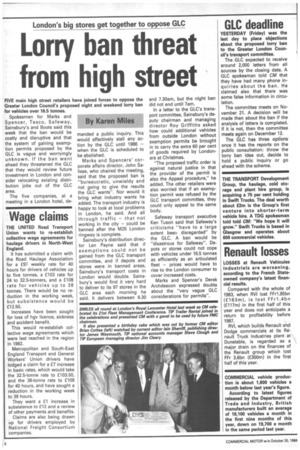Lorry ban threat from high street
Page 6

If you've noticed an error in this article please click here to report it so we can fix it.
By Karen Miles
FIVE main high street retailers have joined forces to oppose the Greater London Council's proposed night and weekend lorry ban for vehicles over 16.5 tonnes.
Spokesmen for Marks and Spencer, Tesco, Safeway, Sainsbury's and Boots said this week that the ban would be costly and disruptive and that the system of gaining exemption permits proposed by the GLC is vague and worryingly unknown. If the ban went ahead they threatened the GLC that they would review future investment in London and consider relocating existing distribution jobs out of the GLC area.
The five companies, at a meeting in a London hotel, de manded a public inquiry. This would effectively stall any action by the GLC until 1986 — when the GLC is scheduled to be abolished.
Marks and Spencers' corporate affairs director, John Salisse, who chaired the meeting, said that the proposed ban is "bureaucratic, unwieldy and not going to give the results the GLC wants". Nor would it bring what industry wants he added. The transport industry is happy to look at local problems in London, he said. And all through traffic — that not working in the city — could be banned after the M25 London ringway is complete.
Sainsbury's distribution director Len Payne said that if exemptions could not be gained from the GLC transport committee, and if depots and stores were in banned areas, Sainsbury's transport costs in London would double. Sainsbury's would find it very hard to deliver to its 97 stores in the GLC area each morning he said. It delivers between 6.30 and 7.30am, but the night ban did not end until lam.
In a letter to the GLC's transport committee, Sainsbury's deputy chairman and managing director Roy Griffiths asked how could additional vehicles from outside London without exemption permits be brought in to carry the extra 60 per cent of goods required by Londoners at Christmas.
"The proposed traffic order is against natural justice in that the provider of the permit is also the Appeal procedure," he added. The other retailers were also worried that if an exemption permit was refused by the GLC transport committee, they could only appeal to the same body.
Safeway transport executive Ken Tuson said that Safeway's criticisms "have to a large extent been disregarded" by the GLC. A ban would be "disastrous for Safeway". Depots or stores could not cope with vehicles under 16.5 tonnes as efficiently as an articulated fleet — prices would have to rise to the London consumer to cover increased costs.
Marks and Spencer's Derek Archdeacon expressed doubts about the "very vague GLC considerations for permits".
































































































































































































































